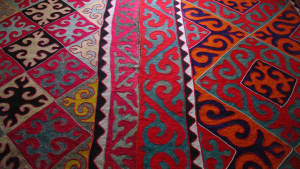Help us protect the commons. Make a tax deductible gift to fund our work. Donate today!

Today we celebrate the 20th anniversary of the UNESCO Convention for the Safeguarding of the Intangible Cultural Heritage. This convention was an important milestone in recognizing intangible cultural heritage or ICH — expressions of culture like performances, oral traditions, rituals and traditional knowledge — as an essential part of the world’s cultural heritage that deserves recognition and protection just like tangible heritage, such as sites and monuments. These cultural manifestations keep heritage alive, and safeguarding them takes more than documentation — transmission from person to person and from generation to generation is key to their survival.
Over the last 20 years, hundreds of ICH elements have been officially recognized by UNESCO, offering them greater visibility and celebrating the diverse ways in which communities express, recreate and transmit their cultural heritage. In the Open Culture Program at Creative Commons, we believe that better sharing of ICH — i.e. making it available for broad access and reuse ethically, equitably, inclusively, respectfully, and responsibly — can be a catalyst for its safeguarding.
Through better sharing, ICH can be revitalized and expressed through new narratives with new voices, renewed, brought into modern contexts, and can be a part of today’s cultural landscape, sustaining dynamic evolution and transmission, in accordance with their bearers’ rights, wishes, needs, and aspirations. Better sharing helps to ensure that ICH manifestations can live beyond the database and continue to enrich the world’s diversity of cultural expressions. One example is the Wiki Loves Living Heritage project, supporting community work in documenting and sharing ICH around the world with the communities’ free, prior and informed consent. The initiative by Te Hiku Media to revitalize Te Reo Māori, the Māori language, as highlighted in Peter-Lucas Jones’s keynote at the CC Global Summit 2023, is a prime example of the importance of language as a vehicle for ICH transmission and safeguarding.
Better sharing to support safeguarding is one of the reasons why we are now leading a community initiative called “Towards a Recommendation on Open Culture” (TAROC), building upon the 2022 UNESCO Mondiacult Declaration’s recognition of culture as a global public good. This initiative aims to support the international community in developing a positive, affirmative, and influential international normative instrument (a “recommendation”) enshrining the values, objectives, and mechanisms for open culture to flourish. In the past few years, UNESCO adopted Recommendations for Open Educational Resources and Open Science, but there is currently no international instrument enshrining Open Culture. Such an instrument would recognize the importance of better sharing of culture as a means to activate and buttress wider cultural and information policy ambitions, including the safeguarding of ICH.
Learn more about the CC community’s TAROC initiative > Also in Shqiptare, Français, Español, 日本語.
Watch this space for more about TAROC and contact us at info@creativecommons.org to see how you can get involved in promoting open culture around the world.
Posted 17 October 2023